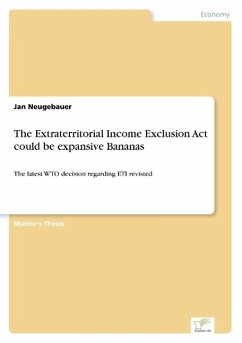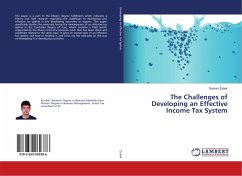Master's Thesis from the year 2002 in the subject Business economics - Trade and Distribution, grade: 1,1, California Western School of Law (unbekannt), language: English, abstract: Inhaltsangabe:Introduction:
About 28 billon dollars is the value of the latest trade disputes between the EC and the US. The EC has battled the US export tax regime since the 1970s, requesting in its latest action before the Dispute Settlement Body (DSB) $4 billion of countervailing measures.
The World Trade Organization (WTO) has become the main battle field for the growing tensions between the United States and European Union in their trade relations. One of the longest and most expensive disputes has been the tax treatment of the exporting businesses by the US. From the very beginning the EC has alleged that these schemes violated the General Agreement on Tariffs and Trade (GATT) and since the foundation of the WTO in 1994 also the Agreement on Subsidies and Countervailing Measures (SCM). On January, 14th 2002 the Appellate Body (AB) affirmed in most parts the decision of the DSB that the Extraterritorial Income Exclusion Act (ETI) violated World Trade Law. I will try to show why this is the case, how the US can change the current taxation system, and why she should try to involve herself more in the ongoing reform of the WTO in the Doha Development Agenda.
In Part I I will therefore briefly outline the ongoing trade war between the US and the EC, outline the two major taxation systems, and put a special emphasis on the history of the Extraterritorial Income Exclusion Act dispute. In Part II I will explain the basics of the ETI tax scheme, summarize basic principles of the WTO s Law of Subsidy, and finally try to explain why the DSB and the AB of the WTO found the ETI-regime violated WTO-Law. In Part III I will evaluate the possibilities the US now has with regard to the ETI as well as to stop the ongoing trade war and strengthening of the WTO in the Doha-Round.
Zusammenfassung:
Im Rahmen der transatlantischen Handelsbeziehungen kam und kommt es zwischen den Vereinigten Staaten und der Europäischen Gemeinschaft seit den 70 er Jahren in regelmäßigen Abständen zu Handelsstreitigkeiten vor den Streitbeilegungsorganen des GATT und der WTO. Als einer der langwierigsten Streitigkeiten zwischen den beiden Akteuren stellen sich die amerikanischen Einkommensteuerregeln für die einheimische exportierende Industrie dar.
Ein Schwerpunkt der Arbeit liegt darin aufzuzeigen, wie der amerikanische Gesetzgeber versuchte eine Schlechterstellung der amerikanischen Industrie durch verschiedenartige Ausgestaltungen des Steuerrechts zu überwinden. Es wird dargelegt unter welchen Voraussetzungen im Rahmen des DISC, FSC und ETI man diese Steuervergünstigungen in Anspruch nehmen konnte.
Weiterhin stellt die Arbeit dar, wieso diese Gesetze gegen das WTO Subventionsrecht verstoßen. Dabei wird noch einmal kurz in das Subventionsabkommen eingewiesen, bevor dann die Entscheidung des DSB Bodies (WT/DS108/AB/RW) genauer untersucht wird.
Letztlich wird versucht Lösungsansätze darzustellen, wie eine WTO konforme Ausgestaltung aussehen könnte und wie man das Streitbeilegungssystem der WTO effektiver ausgestalten könnte.
Inhaltsverzeichnis:Table of Contents:
Extraterritorial Income Exclusion Act could be expensive Bananas - the latest WTO decision regarding ETI revisited3
Introduction3
Part I5
I.The Trade War5
II.Rules of taxation7
1.)General7
2.)Territorial Exemption System of Taxation and CIN8
3.)Worldwide System of taxation and CEN9
III.Legal history of the ETI-Act11
1.)DISC11
a.Pre-DISC11
b.Generally and Formation12
c.The EC, the GATT-Panel, and the 1981 Understanding13
2.)Foreign Sales Corporations Act (FSC)15
a.What is a FSC & Statutory Requirements of Formation15
b.Benefits con...
Hinweis: Dieser Artikel kann nur an eine deutsche Lieferadresse ausgeliefert werden.
About 28 billon dollars is the value of the latest trade disputes between the EC and the US. The EC has battled the US export tax regime since the 1970s, requesting in its latest action before the Dispute Settlement Body (DSB) $4 billion of countervailing measures.
The World Trade Organization (WTO) has become the main battle field for the growing tensions between the United States and European Union in their trade relations. One of the longest and most expensive disputes has been the tax treatment of the exporting businesses by the US. From the very beginning the EC has alleged that these schemes violated the General Agreement on Tariffs and Trade (GATT) and since the foundation of the WTO in 1994 also the Agreement on Subsidies and Countervailing Measures (SCM). On January, 14th 2002 the Appellate Body (AB) affirmed in most parts the decision of the DSB that the Extraterritorial Income Exclusion Act (ETI) violated World Trade Law. I will try to show why this is the case, how the US can change the current taxation system, and why she should try to involve herself more in the ongoing reform of the WTO in the Doha Development Agenda.
In Part I I will therefore briefly outline the ongoing trade war between the US and the EC, outline the two major taxation systems, and put a special emphasis on the history of the Extraterritorial Income Exclusion Act dispute. In Part II I will explain the basics of the ETI tax scheme, summarize basic principles of the WTO s Law of Subsidy, and finally try to explain why the DSB and the AB of the WTO found the ETI-regime violated WTO-Law. In Part III I will evaluate the possibilities the US now has with regard to the ETI as well as to stop the ongoing trade war and strengthening of the WTO in the Doha-Round.
Zusammenfassung:
Im Rahmen der transatlantischen Handelsbeziehungen kam und kommt es zwischen den Vereinigten Staaten und der Europäischen Gemeinschaft seit den 70 er Jahren in regelmäßigen Abständen zu Handelsstreitigkeiten vor den Streitbeilegungsorganen des GATT und der WTO. Als einer der langwierigsten Streitigkeiten zwischen den beiden Akteuren stellen sich die amerikanischen Einkommensteuerregeln für die einheimische exportierende Industrie dar.
Ein Schwerpunkt der Arbeit liegt darin aufzuzeigen, wie der amerikanische Gesetzgeber versuchte eine Schlechterstellung der amerikanischen Industrie durch verschiedenartige Ausgestaltungen des Steuerrechts zu überwinden. Es wird dargelegt unter welchen Voraussetzungen im Rahmen des DISC, FSC und ETI man diese Steuervergünstigungen in Anspruch nehmen konnte.
Weiterhin stellt die Arbeit dar, wieso diese Gesetze gegen das WTO Subventionsrecht verstoßen. Dabei wird noch einmal kurz in das Subventionsabkommen eingewiesen, bevor dann die Entscheidung des DSB Bodies (WT/DS108/AB/RW) genauer untersucht wird.
Letztlich wird versucht Lösungsansätze darzustellen, wie eine WTO konforme Ausgestaltung aussehen könnte und wie man das Streitbeilegungssystem der WTO effektiver ausgestalten könnte.
Inhaltsverzeichnis:Table of Contents:
Extraterritorial Income Exclusion Act could be expensive Bananas - the latest WTO decision regarding ETI revisited3
Introduction3
Part I5
I.The Trade War5
II.Rules of taxation7
1.)General7
2.)Territorial Exemption System of Taxation and CIN8
3.)Worldwide System of taxation and CEN9
III.Legal history of the ETI-Act11
1.)DISC11
a.Pre-DISC11
b.Generally and Formation12
c.The EC, the GATT-Panel, and the 1981 Understanding13
2.)Foreign Sales Corporations Act (FSC)15
a.What is a FSC & Statutory Requirements of Formation15
b.Benefits con...
Hinweis: Dieser Artikel kann nur an eine deutsche Lieferadresse ausgeliefert werden.







![A new Income tax Manual [electronic Resource]: Explaining the Requirements of the Federal Income tax law and the Treasury Department Regulations With A new Income tax Manual [electronic Resource]: Explaining the Requirements of the Federal Income tax law and the Treasury Department Regulations With](https://bilder.buecher.de/produkte/71/71727/71727022m.jpg)
